Food and drink highlights of Germany
- Tipping - It is customary to leave a tip of 5-10% of the total price of the meal.
- Eating hours -
- Shopping hours - Most shops are closed on Sundays.
- Discount shops -
- Cuisine type - Germany does not have a single national cuisine. The cuisine is different depending on the region and its proximity to other countries.
- Savoir Vivre - Table manners: Say 'Mahlzeit' or 'Guten Appetit' before eating. Keep your hands but not your elbows on the table.
- Main ingredients - Many types of meat appear on German tables: pork, beef, chicken, duck, and goose. Hearty vegetables such as red and green cabbage (fresh or fermented into sauerkraut), carrots, radishes, and turnips are popular. Bread (Brot) or a crispy roll (Brötchen) is added to most dishes, and sour cream is also very popular in some regions.
- Most popular alcohol - Beer is by far the most popular drink in Germany.
- Important info - German bread tends to be heavier and more nutritious than bread from Italy, Spain, or France.
- Warning - Don't ask for tap water in a restaurant - it's perceived as stinginess.
Did you find this information valuable?
Thank you for co-creating with us! 😊 Remember to give us feedback by pressing the thumbs up or down under every section.
The quality of content is essential for us. Please let us know what influenced your opinion.
Thank you!
Foods to try in Germany
- Königsberger klopseThis is a tasty dish of meatballs in a creamy white sauce with capers. The meatballs are traditionally made with minced veal, onion, eggs, anchovies, pepper, and other spices. The capers in sauce and lemon juice give this filling dish a surprisingly elegant finish.
- MaultaschenA traditional combination is minced meat, bread crumbs, onions and spinach - all seasoned with salt, pepper and parsley. They're often simmered and served with broth instead of sauce for a tender, creamier treat, but are sometimes pan-fried and buttered.
- LabskausSalted beef, onions, potatoes and pickled beetroot are all mashed up like porridge and served with pickled gherkins and rollmops. It has long been a favorite of Baltic and North Sea sailors.
- SausagesThere are countless cured, smoked and other varieties available across wurst-loving Germany. Some of the most common bratwurst are: Fränkische bratwurst from Franconia with marjoram as a characteristic ingredient; Nürnberger rostbratwurst that is small in size and mostly comes from the grill; Thüringer rostbratwurst from Thuringia, which is quite spicy.
- CurrywurstGrilled, roasted or, less frequently, boiled pork sausage served hot, sprinkled with a large amount of curry spice and poured with a special sauce based on tomato paste.
Did you find this information valuable?
Thank you for co-creating with us! 😊 Remember to give us feedback by pressing the thumbs up or down under every section.
The quality of content is essential for us. Please let us know what influenced your opinion.
Thank you!
Unusual facts about food in Germany
- As a result of the influx of Turkish and other foreign workers, many new flavors and items appeared on the menu.
- The best bakers in the world transform cereal grains into splendid cakes, pastries, and bread.
- Currywurst is not a dish that Germans eat at home; instead, it's eaten 'on-the-go'.
- Germany is the third biggest beer-drinking country in Europe, right after the Czech Republic and Austria.
- Germans drink a lot of coffee, although tea is becoming increasingly popular.
Did you find this information valuable?
Thank you for co-creating with us! 😊 Remember to give us feedback by pressing the thumbs up or down under every section.
The quality of content is essential for us. Please let us know what influenced your opinion.
Thank you!
Place to stay in Germany
- Best booking sites -
- Seasonality - During major events like Munich's Oktoberfest or the Frankfurt Book Fair, rooms are scarce, and rates can double or triple.
- Cost-effective - Rates at hostels are modest and often include breakfast.
- Air conditioning -
- Parking - Most hotels have free parking for guests. However, in the center of large, densely populated cities, parking can be paid. Please check when booking.
- Local names - Bauernhof is a farm that offers rooms to rent - a great option for families.
- Unusual accommodation - You can stay in Schlosshotel - a castle converted into a hotel. Germany has the most of those types of accommodations in Europe.
- Camp - Campsites in Germany are usually of a high standard. Most often, the area is divided especially for campers and separately for tents.
- Important - Some of Germany's older hotels do not have elevators - if you have a problem with climbing the stairs, make sure to request a room on the ground floor.
Did you find this information valuable?
Thank you for co-creating with us! 😊 Remember to give us feedback by pressing the thumbs up or down under every section.
The quality of content is essential for us. Please let us know what influenced your opinion.
Thank you!
Accommodation in Germany
- From three-star up, hotels will be equipped with an on-site restaurant, luggage service, private bathrooms, and a reception desk that stays open at least 12 hours a day.
- In one - and two-star hotels, you'll find smaller rooms and shared bathrooms.
- At four- and five-star hotels, you'll find room service and a range of facilities, including robes and towels.
- German accommodation standards are very high - you can expect clean and comfortable rooms with breakfast included.
- Among the most enjoyable places to stay in Germany are the Romantik Hotels, found in Germany's major cities and smaller towns. Romantik Hotels are located in historic buildings and managed by their owners.
Did you find this information valuable?
Thank you for co-creating with us! 😊 Remember to give us feedback by pressing the thumbs up or down under every section.
The quality of content is essential for us. Please let us know what influenced your opinion.
Thank you!
Getting around Germany
- Most popular - In large cities, the most frequently chosen means of transport is metro.
- Cost-effective - The cheapest transport between the cities y are buses. You can choose from several popular lines: Eurolines, FlixBus or the well-known MegaBus from Great Britain.
- Time-efficient - Railway connections are the fastest and time reliable.
- Traffic safety - Driving on German roads is usually a pleasure and an opportunity to admire the scenery. The roads are well kept.
- Important - If the lights on your vehicle are in any way broken, avoid driving at night. It is strictly prohibited to drive with parking lights alone.
- Warning - It is better not to drive through a red traffic ligh, even in the most rural areas. Cameras are set up in various locations and the system is becoming more centralized day by day.
Plane
- If you’re flying to Frankfurt with Lufthansa (its central hub is located in Frankfurt) you'll find fast connections to other cities by plain or train directly from the airport.
Train
- The platforms usually have moving signs that will tell you all the stops on the line and which side of the platform the train will be on.
- U-Bahn trains are underground subway lines.
- S-Bahn is a rapid overland train.
- Inter-City-Express Train (ICE) is a rapid train that travels between main cities.
- Certain train cars are silent or offer stronger cell phone coverage.
- If you are traveling a long distance, a sleeper train can save you time and cost of the overnight stay at a hotel.
- If you're looking for the Central Station of the city, make sure you get off at the stop marked as 'Hbf' — which stands for Hauptbahnhof.
- You can make a reservation 90 days in advance and after you receive your booking number you can enter it into the ticket machine at your local train station to print it out.
- You can check the information on timetables, services, and discounts at: www.bahn.de/p/view/index.shtml.
Car
- Renting a car in major cities can be more of an obstacle than a help.
- Parking rules are strict, spaces may be scarce, and hotel parking in the city center is quite expensive.
- Rates are cheaper if you reserve it in advance.
- You can save money if you will drive a car with manual transmission.
Bus
- The hop-on hop-off bus tickets are often budget-friendly and take you all over the city to the main attractions and neighborhoods, giving you a stress-free way to get around.
Taxi
- Taxi drivers are usually very friendly, helpful, fair, and have a lot of knowledge about the city that they are willing to share with their passengers.
- In Germany, all taxis are beige. This appearance was officially designated by law in 1971 as 'Elfenbein' which stands for ivory-colored light.
- They can be 'caught' on the street or taken from a stop. Free taxis have an illuminated 'TAXI' sign on the roof.
- At the end of the ride, it's best to read the meter's tariff in order to be charged correctly.
- When ordering transport for a distance of more than 50 km, the journey's price can be negotiated.
Motorcycle
- In Berlin, scooters are a cheap transport option.
Hitchhiking
- Hitchhiking has a very good reputation in Germany. There are some luminaries, like Dieter Wesch the „Angel of Hitchhikers“. He picked up 9528 hitchhikers so far.
- Some of the biggest hitchhiking competitions in the world take place in Germany.
- The fastest way to hitchhike is on the motorways in the service area where drivers can legally stop.
- Hitchhiking in Germany is generally legal. It is only forbidden on the motorway itself, which means you cannot hitchhike standing on the emergency lane or the side of the road.
Did you find this information valuable?
Thank you for co-creating with us! 😊 Remember to give us feedback by pressing the thumbs up or down under every section.
The quality of content is essential for us. Please let us know what influenced your opinion.
Thank you!
How to travel in Germany
- In a public transport might be a smart option to buy a special city card.
- The city transport card gets you discounts on certain attractions and restaurants.
- German rail is expensive.
- Frankfurt airport is said to be the best equipped in the world.
- All major cities have impressive public transport systems. Tube, trams and busses assure reliable transportation. There often is a network of night buses during the night, which is a cheaper alternative to taking a taxi.
Did you find this information valuable?
Thank you for co-creating with us! 😊 Remember to give us feedback by pressing the thumbs up or down under every section.
The quality of content is essential for us. Please let us know what influenced your opinion.
Thank you!
Best time to visit Germany
When to go
- Although no season might guarantee stable weather conditions, the best period to visit Germany goes from mid-May to September, since the temperatures are generally pleasant. September is usually appreciated because of the lower chance of thunderstorms and the fall foliage. In contrast, in June, the days are very long, especially in the north.
Temperature
- The lowest temperatures are around -10 ° C in winter and the highest 35 ° C in the summer months.
- In July, the mean temperature is 16.9 °C, and in January -0.5 °C. Usually winters in Germany are particularly mild, and the summers particularly hot.
Rainfall
- The average annual rainfall in Germany is 787.4mm and occurs evenly throughout the year. The coastal regions and high mountains receive sample rainfall.
Spring/Fall
- Spring and autumn are mild to cold with frequent rainfall in the early season and snowfall in the late season.
Summer
- Summers in Germany are warm and humid, with moderate rainfall.
Winter
- Winters are generally mild but can sometimes be harsh with heavy snowfall and temperatures well below zero, especially in eastern, southern, and mountainous regions.
Did you find this information valuable?
Thank you for co-creating with us! 😊 Remember to give us feedback by pressing the thumbs up or down under every section.
The quality of content is essential for us. Please let us know what influenced your opinion.
Thank you!
Germany weather Insights
- Germany has a temperate climate with warm summers and cold winters.
- Rain falls throughout the year.
- Due to the various mountain and hill areas, the weather varies throughout the country.
- In summer it will become warmer in the south, but it is exactly the opposite in the winter months.
- Northwestern and coastal Germany have a maritime influenced climate characterized by warm summers and mild cloudy winters.
Did you find this information valuable?
Thank you for co-creating with us! 😊 Remember to give us feedback by pressing the thumbs up or down under every section.
The quality of content is essential for us. Please let us know what influenced your opinion.
Thank you!
Savoir-Vivre in Germany
- Greetings - Always shake hands when saying hello and goodbye. The grip should be secure and cordial, and you should look the other person in the eye.
- Punctuality -
- Dress code - Dress neatly and suitably for the occasion.
- Temple entrance - Dress respectfully as it’s a place of worship (cover your shoulders).
- Home invitation - If you are visiting someone’s house, it’s better to show gratitude with a small gift such as flowers, wine or candy. Also, remember to take off your shoes when entering their home.
- Etiquette - Use formal pronouns, titles, and last names when talking to people who are not your friends. Germans do not let women pass in the door nor kiss their hands to greet them.
- Drones - We recommend using this map to easily check the applicable restrictions. If you are looking for more specific information take a look here.
Did you find this information valuable?
Thank you for co-creating with us! 😊 Remember to give us feedback by pressing the thumbs up or down under every section.
The quality of content is essential for us. Please let us know what influenced your opinion.
Thank you!
Things not to do in Germany
- Bring some cash with you - many restaurants may not accept card payments.
- Make sure you have good medical insurance before arriving - hospitalization costs are high in Germany.
- Don't show any Nazi-related gestures or symbols - it's illegal.
- Don't jaywalk - you may be heavily fined.
- Don't make any phone calls after 8 PM. It’s considered a disturbance of people's evening routine.
Did you find this information valuable?
Thank you for co-creating with us! 😊 Remember to give us feedback by pressing the thumbs up or down under every section.
The quality of content is essential for us. Please let us know what influenced your opinion.
Thank you!
Interesting facts about Germany
- At the beginning of school education in the first grade, each child receives a giant cone filled with toys and candies.
- The government can reject unusual baby names.
- Prostitution and public drinking are legal in Germany.
- It's considered bad luck to wish someone 'Happy Birthday' in advance.
- In German, responding 'danke' (thanks) means no.
Did you find this information valuable?
Thank you for co-creating with us! 😊 Remember to give us feedback by pressing the thumbs up or down under every section.
The quality of content is essential for us. Please let us know what influenced your opinion.
Thank you!
Best souvenirs from Germany 💝
Germany is a beautiful, interesting and diverse country - so choosing the right souvenirs from our holiday in Germany can be a challenge. Check which souvenirs are best to bring from Germany, so that our loved ones will be happy and remember this trip for a long time!
🍺 Beverages
Eierliköer 💲 💲 💲 💲
Egg liqueur is usually consumed during the Christmas holidays. This alcohol drink is made of yolk, sugar, vanilla, and rum or whiskey.
🛒 Where to buy: grocery stores, liquor stores
💰 Price range: 5 - 15 EUR
🎁 For whom: grandparents, parents, spouse, friends

Sauerkraut juice 💲 💲 💲 💲
It may not be the tastiest or the most pleasing thing a person can try, but it is very useful for the body. Cabbage juice is good for stomach problems, and is gaining popularity these days thanks to spreading healthy lifestyles.
🛒 Where to buy: grocery stores
💰 Price range: 2 - 6 EUR
🎁 For whom: grandparents, parents, friends

Tea 💲 💲 💲 💲
One of the most popular regions where you can find German tea is East Frisia in Lower Saxony, where it is worth trying fruit tea (Fruchtetee) or black tea (Schwarztee). Another well-known region is Munich in Bavaria, where Joseph Eilles created his own tea recipe and opened the first tea store.
📌 Region: East Frisia, Bavaria
🛒 Where to buy: tea stores, grocery stores, supermarkets
💰 Price range: 2 - 10 EUR
🎁 For whom: grandparents, parents, friends, spouse

👚 Clothes
Birkenstock shoes 💲 💲 💲 💲
This specific type of footwear can be simply described as something between a sandal and a flip-flap. Germans have been producing these shoes for over 200 years and the reason that makes them so popular is simple - comfort. Their rubber sole makes them very comfortable.
🛒 Where to buy: shoe shops, boutiques
💰 Price range: 25 - 70 EUR
🎁 For whom: grandparents, parents, spouse, kids

Lederhosen/Dirndl 💲 💲 💲 💲
Lederhosen and Dirndl are elements of the traditional Bavarian attire, particularly suited to the climate of the Oktoberfest, during which the residents dress according to tradition. Lederhosen is nothing but men's leather shorts and Dirndl is a female silk dress.
📌 Region: Bavaria
🛒 Where to buy: department stores, dedicated shop
💰 Price range: 300 - 1000 EUR
💡 Pro tip: It is easier to buy them during the Oktoberfest.
🎁 For whom: spouse
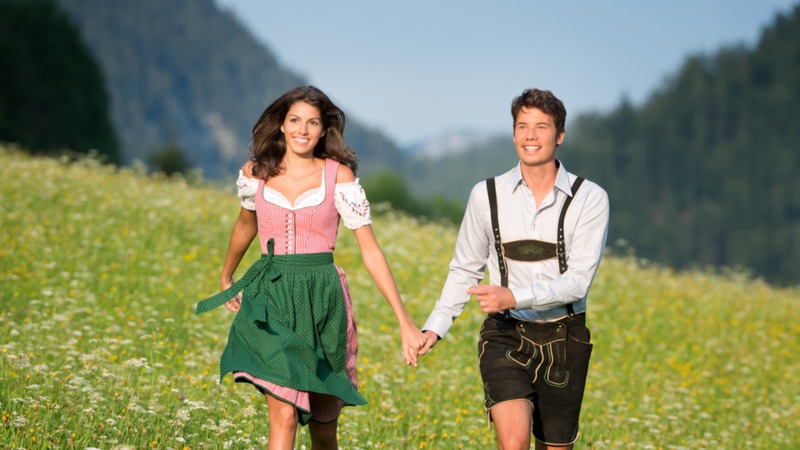
🛍 Collections
Ampelmännchen 💲 💲 💲 💲
One of the characteristic memorabilia associated with the German capital - street lights designed for passers-by during the GDR era in eastern Germany. The icons show the behavior of two men in different attitudes, depending on whether the light is green or red. Today, the motifs can be found on T-shirts, mugs, glasses and even in the form of cake tins.
📌 Region: Berlin
🛒 Where to buy: gift shops
💰 Price range: 5 - 20 EUR
🎁 For whom: grandparents, parents, spouse, friends

Beer steins 💲 💲 💲 💲
Related to the Bavarian region, large tankards are made of porcelain or stoneware. They are most often used during the Oktoberfest. The origin of this famous lid dates back to the 14th century, when an order was issued to cover food and drink in order to prevent the spread of epidemics.
📌 Region: Bavaria
🛒 Where to buy: beer halls
💰 Price range: 30 - 70 EUR
💡 Pro tip: Beer halls sell the steins of the best quality.
🎁 For whom: parents, friends, spouse
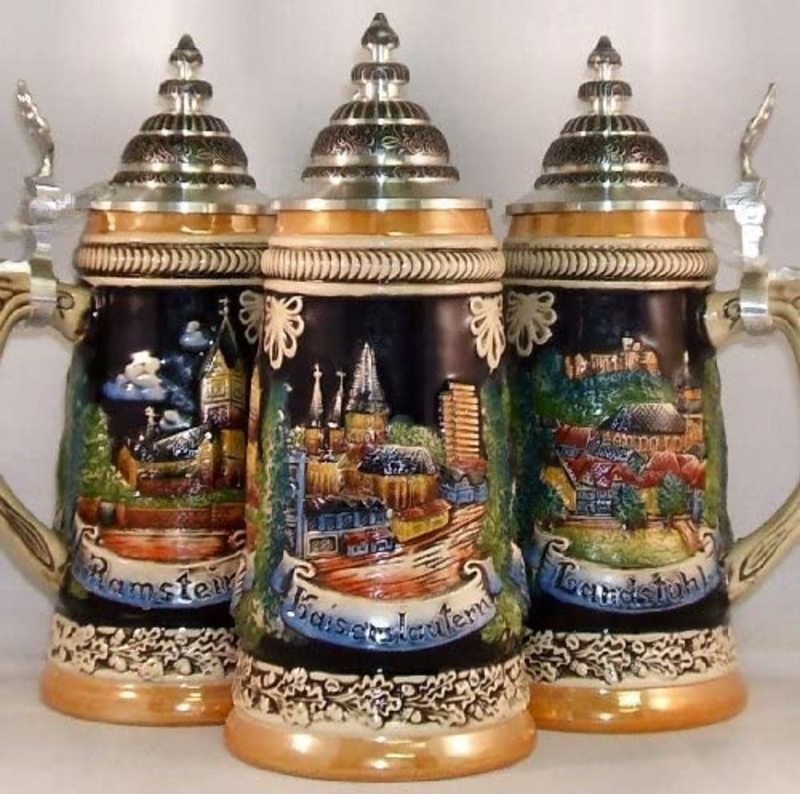
Feuerzangenbowle set 💲 💲 💲 💲
The mulled wine set consists of a large bowl, which is filled with mulled wine with spices, and a slice of sugar soaked in rum is placed on top. The whole thing is placed above the fire. Under the influence of temperature,sugar begins to melt and drips into the bowl, combining with wine and creating a delicious alcoholic beverage.
🛒 Where to buy: christmas stores, department stores
💰 Price range: 50 - 150 EUR
🎁 For whom: grandparents, parents, spouse

💄 Cosmetics
Cologne 💲 💲 💲 💲
The famous term 'Kölnisch Wasser' (German) or 'Eau de Cologne' (French) refers to the toilet water, the production of which began over 200 years ago in Cologne. This well-known Eau de Toilette is used by both men and women.
📌 Region: North-Rhine Westphalia
🛒 Where to buy: drugstores, pharmacies, perfumeries
💰 Price range: 25 - 100 EUR
🎁 For whom: spouse
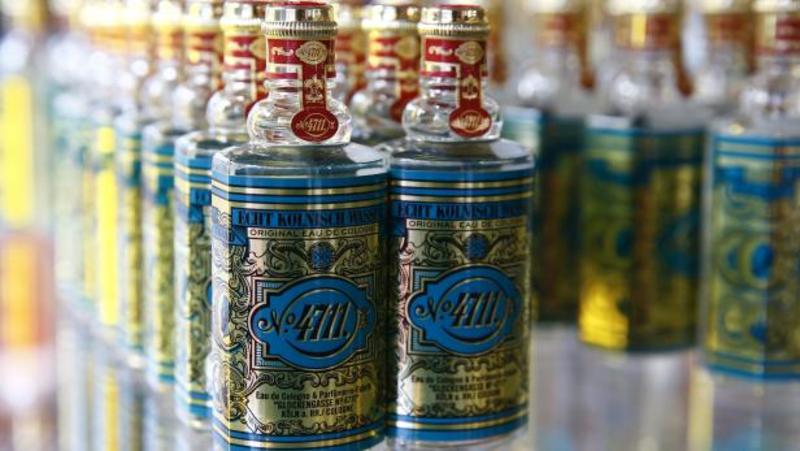
Frau Toni's perfumes 💲 💲 💲 💲
The brand was founded about 10 years ago by Stefanie Hanssen. The brand's stores are most often found in Berlin. Everyone will find something for themselves, as the company produces both male and female scents.
📌 Region: Berlin
🛒 Where to buy: Frau Toni shops
💰 Price range: 20 - 100 EUR
🎁 For whom: spouse

Manicure set 💲 💲 💲 💲
Germany produces high quality nail care accessories - you should be prepared for high prices, but the product is worth the money.
🛒 Where to buy: dedicated shops, drugstores
💰 Price range: 50 - 250 EUR
🎁 For whom: spouse
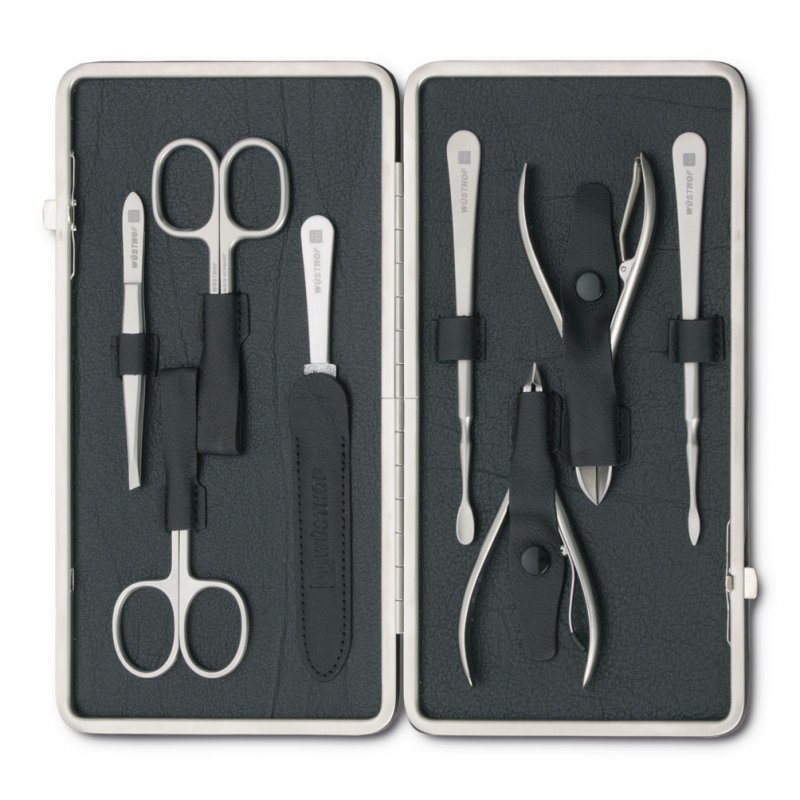
🥗 Food
Blutwurst 💲 💲 💲 💲
The black pudding, made of German 'Blutwurst', is usually sold in jars. It is said that one of the better ones can be found in Berlin, so you should start your search there.
📌 Region: Berlin
🛒 Where to buy: butcher shops, markets
💰 Price range: 5 - 20 EUR
🎁 For whom: grandparents, parents, friends
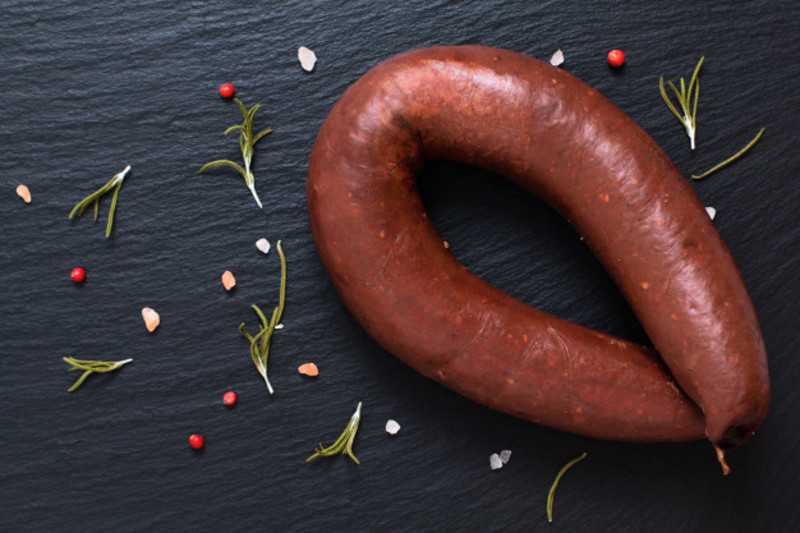
Chocolate 💲 💲 💲 💲
If you're a fan of sweets, you've come to the right place! Many delicious chocolates from companies such as Kinder Schokolade, Trumpf Schokolade, Ritter Sport or Milka come from Germany.
📌 Region: North-Rhine Westphalia
🛒 Where to buy: supermarkets, grocery stores, chocolate museums
💰 Price range: 1 - 10 EUR
💡 Pro tip: Look for those labeled as made in Germany.
🎁 For whom: grandparents, parents, spouse, friends, kids

Gummy bears 💲 💲 💲 💲
Haribo, one of the most famous gelding companies, was founded by a German, Hans Riegel in the 1920s. Today, despite the brand's worldwide expansion, many of its fans claim that Haribo’s jelly beans still taste the best in Germany.
🛒 Where to buy: grocery stores, gift shops, supermarkets
💰 Price range: 5 - 20 EUR
🎁 For whom: grandparents, parents, friends, spouse, kids

Lebkuchen 💲 💲 💲 💲
Lebkuchen is a heart-shaped gingerbread that can be found at every Christmas market.
🛒 Where to buy: Christmas markets
💰 Price range: 1.5 - 5 EUR
🎁 For whom: grandparents, parents, spouse, friends, kids
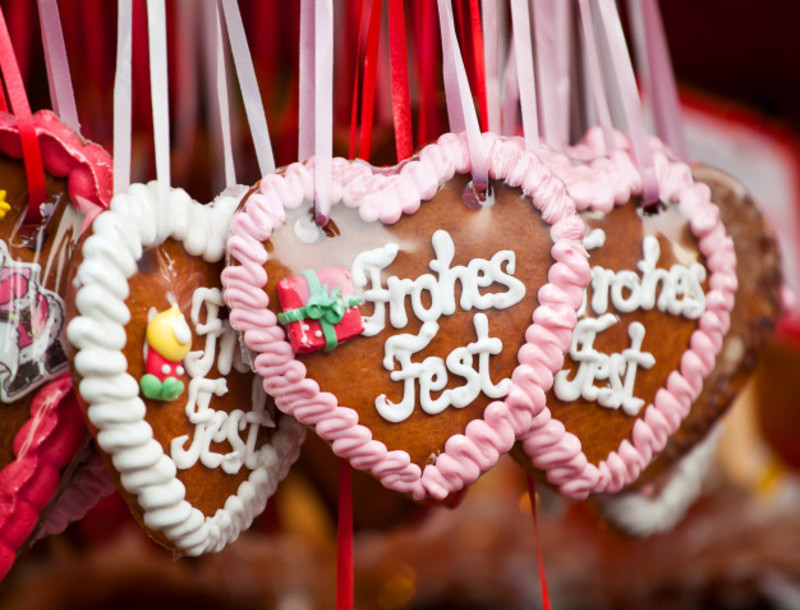
🖖 Handmade
Hummel figures 💲 💲 💲 💲
The appearance of the Hummel figures is based on the work of Maria Innocentii Hummel, an artist and nun who lived in the 20th century. The figurines are handmade from porcelain and then painted.
🛒 Where to buy: gift shops
💰 Price range: 8 - 40 EUR
🎁 For whom: grandparents, parents, friends, spouse
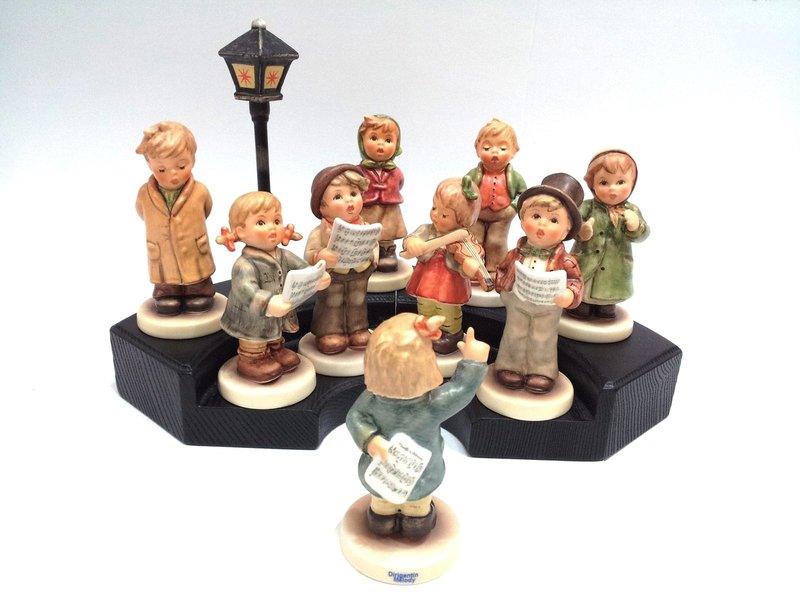
Stuffed toys 💲 💲 💲 💲
Stuffed toys from German manufacturer Steiff are among the most iconic and recognizable items in Germany. The most popular are teddy bears. Handmade toys owe their exceptional quality to the materials they are made of, such as plush, mohair or felt.
📌 Region: Bavaria
🛒 Where to buy: toy shops, Steiff original shops
💰 Price range: 20 - 100 EUR
🎁 For whom: kids
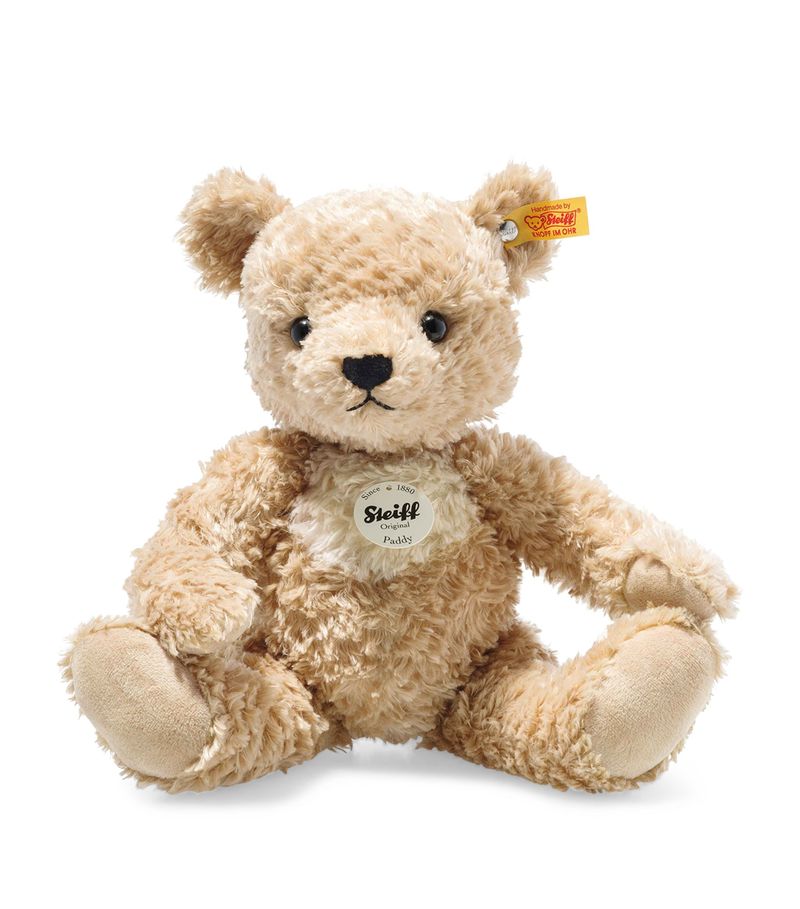
🏡 Home Decor
Christmas ornaments 💲 💲 💲 💲
The Germans invented a lot of Christmas decorations - after all, this is where the tradition of dressing the Christmas tree comes from. Decorations are the easiest to find at fairs and Christmas markets.
📌 Region: Bavaria
🛒 Where to buy: Christmas markets, dedicated Christmas shops (so called Käthe Wohlfahrt)
💰 Price range: 5 - 50 EUR
💡 Pro tip: Watch out for chinese cheap imitations.
🎁 For whom: grandparents, parents, spouse, friends
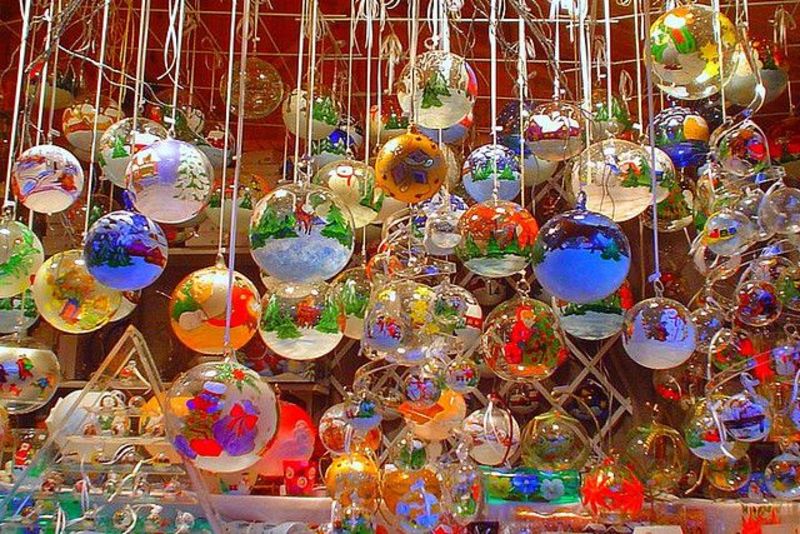
Cuckoo clock 💲 💲 💲 💲
The iconic cuckoo clock originally comes from southwestern Germany, more precisely from the region called the Black Forest. The clock is made of wood, designed and constructed to look like a hut or a house. The characteristic sound is of course made by the cuckoo at fixed hours during the day.
📌 Region: Black Forest
🛒 Where to buy: markets, gift shops
💰 Price range: 50 - 150 EUR
🎁 For whom: grandparents, parents, spouse
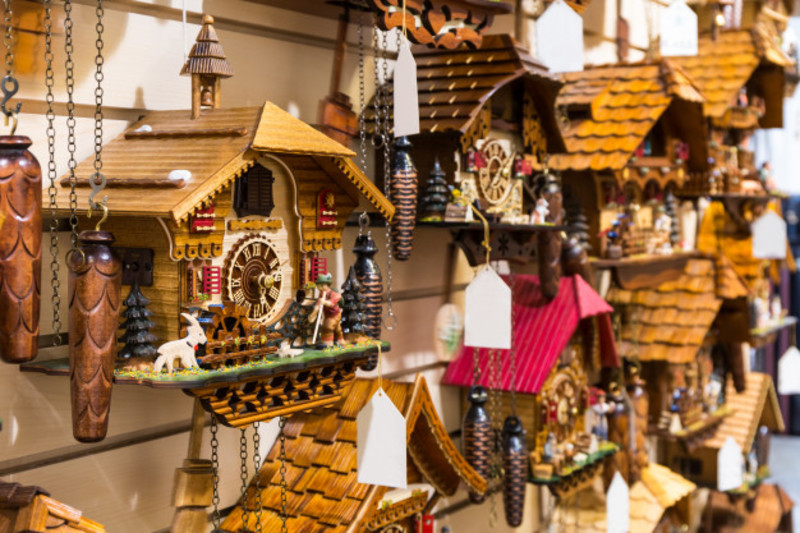
Tablecloth 💲 💲 💲 💲
Germany produces tablecloths specially designed and made for special occasions such as Christmas, Easter or simply the holiday season. However, the most popular and most used are the Christmas versions.
🛒 Where to buy: dedicated shops
💰 Price range: 10 - 30 EUR
🎁 For whom: grandparents, parents
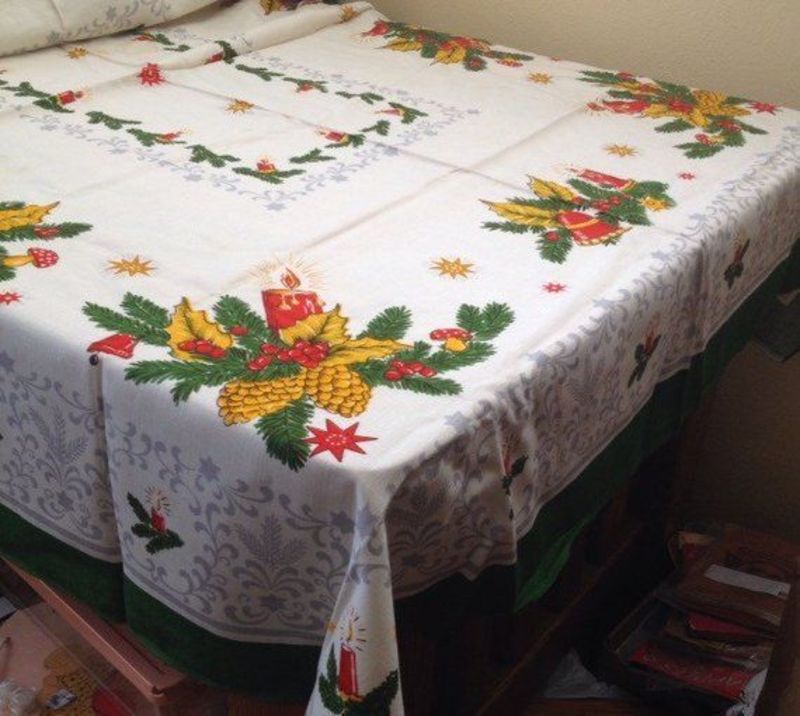
 Germany - Souvenirs
Germany - Souvenirs
Regardless of whether you are looking for a gift for children, friends or a partner - we hope you have found something perfectly suited to their taste! Or maybe you have a different idea of what to bring from your holiday in Germany? Let us know !
Did you find this information valuable?
Thank you for co-creating with us! 😊 Remember to give us feedback by pressing the thumbs up or down under every section.
The quality of content is essential for us. Please let us know what influenced your opinion.
Thank you!
Germany packing list 💡
- Comfortable, proven shoes - No matter how you plan to spend your time in Germany, this country is full of beautiful landscapes and architectural gems. You will spend a lot of time traveling on foot.
- Rain jacket and warm sweatshirt - As in most Central European countries, the weather in Germany can surprise you. Cool evenings and unexpected rainfall can appear unexpectedly even in the middle of summer.
- Winter tires and chains - If you go skiing without these items, you may not be able to reach some places.
- A well-stocked first aid kit - Medicines, drops and ointments for common ailments. Medicines cost a fortune in Germany.
- International ID cards and discount cards - We can meet the discounts in various situations and places, ranging from accommodation and ending with admission tickets.
Did you find this information valuable?
Thank you for co-creating with us! 😊 Remember to give us feedback by pressing the thumbs up or down under every section.
The quality of content is essential for us. Please let us know what influenced your opinion.
Thank you!
Get a personalized packing list before travel to Germany 🧳
Health information
Health risks and required vaccinations
Packing lists
Personalized item list to pack matching your destination
Weather insights
Packing list adjusted to local weather
To-do lists
Everything you need to do before leaving home
Weight limits
Never pay excess baggage fees again
Local prices
Average cost of food, tickets and accommodation
Tourist information about Germany
| Country | Germany |
| Capital | Berlin |
| Currency | European euro |
| Language | German |
| Timezone | GMT+1 |
| English speaking | Widely spoken (advanced) |
| LGBT tolerance | Very high |
| Gender ratio (overall) | 51% | 49% |
| Population | 83.8 mln |
| Visitors per year | 39.6 mln |
Did you find this information valuable?
Thank you for co-creating with us! 😊 Remember to give us feedback by pressing the thumbs up or down under every section.
The quality of content is essential for us. Please let us know what influenced your opinion.
Thank you!
Useful information about Germany
| Card payments | |
| ATM Availability | Widely available |
| Suggested ATM takeout | 100 EUR |
| Drinking in public | |
| Tap water | |
| Internet speed (avg.) | 50 Mbps |
| Socket type |
|
| Best taxi app | |
| Public toilets | Popular & Paid |
| Top mobile providers | Telekom, O2, Vodafone |
| Best internal air carrier | Lufthansa |
Did you find this information valuable?
Thank you for co-creating with us! 😊 Remember to give us feedback by pressing the thumbs up or down under every section.
The quality of content is essential for us. Please let us know what influenced your opinion.
Thank you!
Cost of living in Germany
| Meal, Inexpensive Restaurant |
10 EUR
11.8 USD
8.73 GBP
42.19 PLN
|
| Meal for 2 People, Mid-range Restaurant |
50 EUR
58.99 USD
43.66 GBP
210.93 PLN
|
| Domestic Beer (0.5 liter draught) |
3.5 EUR
4.13 USD
3.06 GBP
14.76 PLN
|
| Gasoline (1 liter) |
1.44 EUR
1.7 USD
1.26 GBP
6.07 PLN
|
| One-way ticket (public transport) |
2.8 EUR
3.3 USD
2.44 GBP
11.81 PLN
|
Did you find this information valuable?
Thank you for co-creating with us! 😊 Remember to give us feedback by pressing the thumbs up or down under every section.
The quality of content is essential for us. Please let us know what influenced your opinion.
Thank you!
Quality of life in Germany
| Quality of life | Very high |
| Safety Index | High |
| Healthcare likability | High |
| Climate likability | Very high |
| Costs of living | Moderate |
| Level of pollution | Low |
Did you find this information valuable?
Thank you for co-creating with us! 😊 Remember to give us feedback by pressing the thumbs up or down under every section.
The quality of content is essential for us. Please let us know what influenced your opinion.
Thank you!
Important numbers
| General emergency number (mobile phone) | 112 |
| Fire | 112 |
| Police | 110 |
| Ambulance | 112 |
Did you find this information valuable?
Thank you for co-creating with us! 😊 Remember to give us feedback by pressing the thumbs up or down under every section.
The quality of content is essential for us. Please let us know what influenced your opinion.
Thank you!

